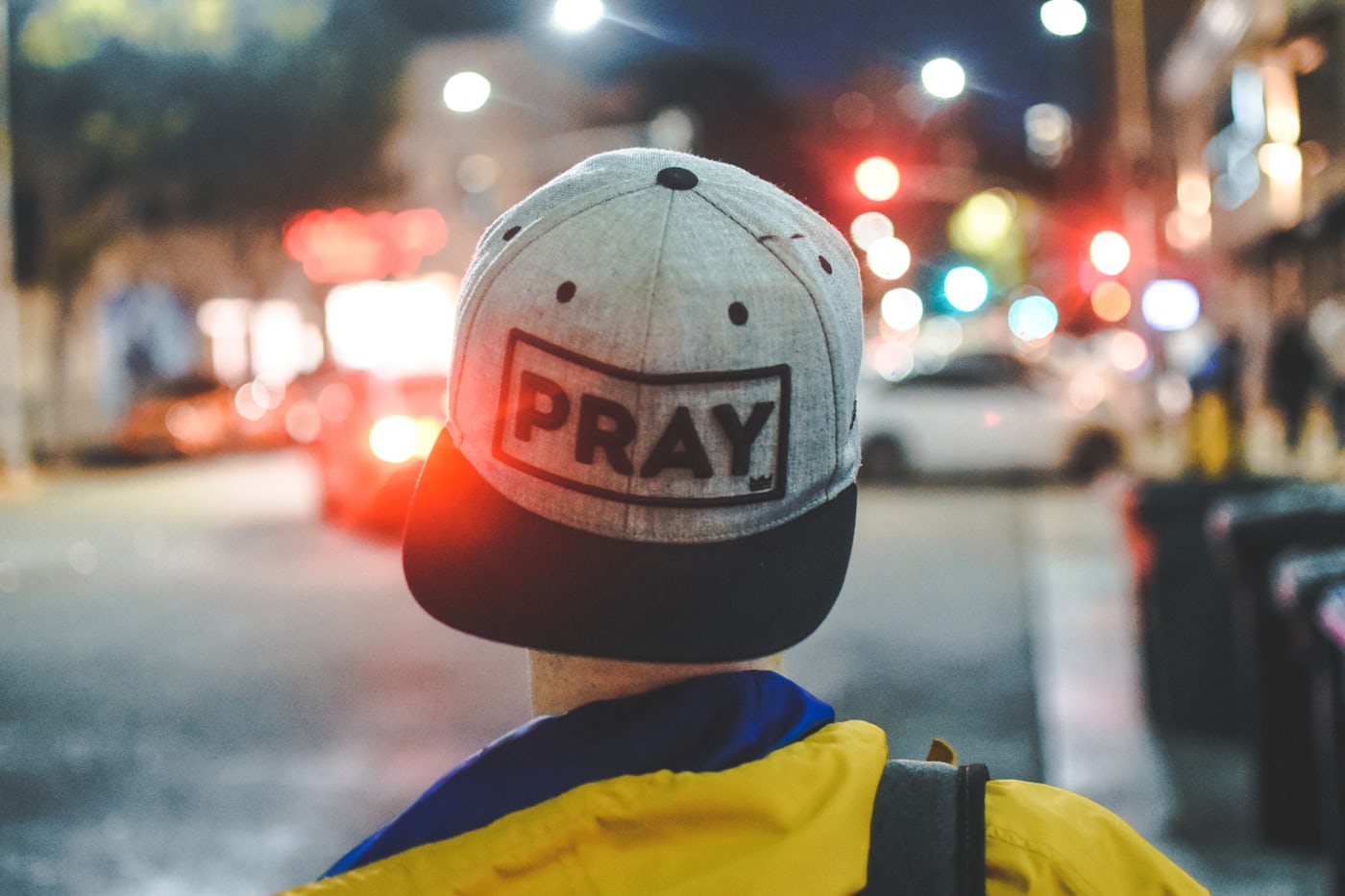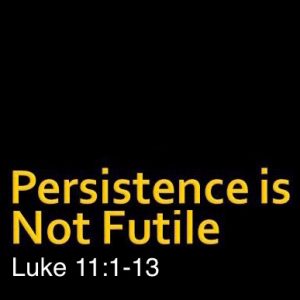
What Is Prayer Actually Worth To You?

Photo credit: Joshua Hanks
“The first thing I want you to do is pray. Pray every way you know how, for everyone you know. Pray especially for rulers and their governments to rule well so we can be quietly about our business of living simply, in humble contemplation. This is the way our Savior God wants us to live” (1 Timothy 2:1-3).
What is your response when someone offers to pray for you? You welcome the prayer, right? Have you ever replied, “No thanks, I don’t want your prayer”? Some people may resist the suggestion of prayer for any number of reasons, but most of the time, people welcome prayer. Our congregation’s active prayer list engages us and every week as we share requests and answers to prayer encourage all of us. But how much is prayer actually worth to you?
What is Prayer?
Prayer may best be described as a conversation with God. While folding our hands is frequently associated with someone praying, hand-folding is not required for God to hear us, of course! Eyes open or closed. Standing, sitting, walking, driving, or any possible activity can be a perfect context for taking to God. Remember, the apostle Paul said to pray without ceasing (1 Thessalonians 5:17).
Since we can pray anywhere, we can also pray about anything and about the full range of life’s experiences. Alone or with others. No special formula, language, or method is required, either. No practice is necessary to make a connection to God. Just direct your thoughts to God. God even offers the Holy Spirit to help us when we just don’t know how to pray (Romans 8:26-27).
Our prayers may be for ourselves or others, silent or spoken aloud, expressed in words, art, music, or dance, or any other medium. Prayer can be urgently offered in crisis or during planned, peaceful, or contemplative moments. Succinct or expansive, and capturing our every possible feeling and emotion, and concerning any and every imaginable situation, prayer with God is an amazing, personalized, way to be in touch with God through Christ.
Prayer In the Bible
In God’s word, people interacted with God believing that prayer was also a method of changing a situation or themselves for the better. Abraham prayed that God would not destroy the city, Jacob prayed for strength when he was going to a stressful family reunion, Moses prayed for mercy for his people, Joshua confesses his people’s sins, Hannah prayed for a family, Daniel for freedom, Nehemiah for transformation, Job prayed for his friends (Job 42:10) and Solomon prayed for wisdom (1 Kings 3:1-15). The Book of the Psalms is filled with prayers from requests to expressions of anger and sorrow, including intercessions, praise, and thanksgivings. Certainly there must be value to prayer because interacting with the Creator is a real life experience. People correlate praying with results, either experienced inwardly, or externally.
Jesus practiced what he preached about prayer and made it a priority, both in private (Mark 1:15, Matthew 14:23), and in public (Luke 22:32, 41-44), and famously from the cross where he died for the sins of the world, praying, “Father, forgive, them, for they do not know what they are doing” (Luke 23:34). Jesus taught us how to pray (Matthew 6:9-13, Luke 11:1-13), to not use prayer to get attention from others (Matthew 6:5-6), to pray before making an important decision (Luke 6:12-13), to pray boldly (Mark 11:24), and pray for the success of God’s mission (Luke 10:22, Matthew 9:38). Jesus continually prays for us, too! (Romans 8:34). If prayer didn’t matter, would Jesus pray?
The letters of the New Testament are similarly filled with reminders of the value of prayer. In James’ letter, “…pray for each other…” because, “the prayer of a person living right with God is something powerful to be reckoned with” (James 5:17). The apostle Paul wrote, “Don’t fret or worry. Instead of worrying, pray. Let petitions and praises shape your worries into prayers, letting God know your concerns. Before you know it, a sense of God’s wholeness, everything coming together for good, will come and settle you down. It’s wonderful what happens when Christ displaces worry at the center of your life” (Philippians 4:6-7 The Message). We are to “pray without ceasing” (1 Thessalonians 5:16-18), and to pray for our civic leaders and neighbors (1 Timothy 2:1-3, 1 John 5:14-15, 1 Peter 3:12, Colossians 1:9-12).
What About “Thoughts and Prayers”?
In our experience, prayers matter. But can we learn anything about what people ion general think about prayer? Following natural disasters, mass shootings, or catastrophes, politicians and religious leaders often offer up their “thoughts and prayers” to victims. Our nation historically values prayer. For example, both houses of Congress open each session with prayer, the government continues to provide chaplains for the armed forces (an important part of their ministry is prayer), and other civic, public, and private organizations may include prayer in their proceedings. Detractors criticize the phrase, “Our thoughts and prayers are with you,” as meaningless, asserting that prayer offers no real value. In a recent issue of the Journal of the National Academy of Sciences, researchers sought to quantify the value people attributed to prayer. Critics argue that the phrase is cheap, and it doesn’t equate to real action. It may be offered to sound like “I really care,” but really means “I won’t do anything.” Christians frequently seek other’s prayers, especially during difficult or painful times.
The researchers took an economic approach to determining the value of thoughts and prayers. (For the full article, “The Value of Thoughts and Prayers,” visit https://www.pnas.org/content/early/2019/09/10/1908268116.)
For example, the findings showed that recipients of prayer often expect some kind of direct benefit (improved health or Increased wealth), or gain feelings of hope and connection to others, or to reduce their anxiety. Participants in the study self-identified as one of three groups: Christian, atheist, or agnostic. In the experiment, they were told that a stranger would be learn about their recent hardship and in return, the participant would receive that stranger’s thoughts and prayers. The experiment evaluated how much the thoughts and prayers mattered to each group. On average, Christian respondents valued the gesture, but nonreligious people negatively valued the gesture when offered by Christians, and were indifferent to receiving the thoughts and prayers from other nonreligious people. The study also suggested that while others may sincerely offer their thoughts and prayers, when no other gesture was offered, its impact was less recognized. Everyone agreed that the words alone were secondary if not also linked to other actions.
Prayer In Motion
Wait, that sounds like what we read in James’ letter when he wrote about faith in action:
“Dear friends, do you think you’ll get anywhere in this if you learn all the right words but never do anything? Does merely talking about faith indicate that a person really has it? For instance, you come upon an old friend dressed in rags and half-starved and say, “Good morning, friend! Be clothed in Christ! Be filled with the Holy Spirit!” and walk off without providing so much as a coat or a cup of soup—where does that get you? Isn’t it obvious that God-talk without God-acts is outrageous nonsense?” (James 2:16-17).
The bottom line? Pray. It matters. To you. To (most) others. And, it actual
The bottom line?
Pray. But remember prayer may be like like faith, without a corresponding action it is, well, using the words of James, dead. Look for opportunities to do more than pray. Don’t stop sharing with God, listening, and learning with God’s Spirit in community with others. Pray. Do. That’s why faith communities gather…to provide spiritual resources to follow Jesus with energy, intelligence, imagination, and love! There are amazing benefits to prayer, both to the one praying and to the recipients of those prayers. (And when you want to offer prayer for others and want them to know you are praying for them, its a great idea to politely ask if they’d welcome the prayer to begin with.) Whatever their response can be a wonderful moment for engagement. Active, authentic prayer is always connected to active, authentic action.
Pastor Kevin

 Last week we revisited the first moon landing on July 20, 1969. Wow. (You may listen to the message, Mary, Martha, and the Moon, just below on this page.) This week, we hear Jesus teach his followers a prayer. We refer to it as The Lord’s Prayer, but is it the “Lord’s” prayer”? Maybe it should have been called the Disciple’s Prayer, but the Prayer, whatever its title, is a common-sounding prayer. What made the Prayer unique was not it content, but to whom it was addressed. No rabbi in Jesus time, or before or since, would have started any prayer referring to God as “Daddy”! That’s right. “Our Father…” is the term “Daddy” and Jesus shocked his listeners who were not used to having such a personal relationship with the Creator! What’s more, after Jesus’ outrageous prayer lesson, he tells a few stories that encouraged the disciples to even be persistent in prayer, courageous in prayer, with God. Now that’s shocking!
Last week we revisited the first moon landing on July 20, 1969. Wow. (You may listen to the message, Mary, Martha, and the Moon, just below on this page.) This week, we hear Jesus teach his followers a prayer. We refer to it as The Lord’s Prayer, but is it the “Lord’s” prayer”? Maybe it should have been called the Disciple’s Prayer, but the Prayer, whatever its title, is a common-sounding prayer. What made the Prayer unique was not it content, but to whom it was addressed. No rabbi in Jesus time, or before or since, would have started any prayer referring to God as “Daddy”! That’s right. “Our Father…” is the term “Daddy” and Jesus shocked his listeners who were not used to having such a personal relationship with the Creator! What’s more, after Jesus’ outrageous prayer lesson, he tells a few stories that encouraged the disciples to even be persistent in prayer, courageous in prayer, with God. Now that’s shocking!
 Remember growing up with the Sears Christmas Wish Book? I do. Flipping through pages filled with toys and gift ideas delighted kids of all ages as they marked their favorite items, hoping mom and dad noticed in time for Christmas. What did you wish for?
Remember growing up with the Sears Christmas Wish Book? I do. Flipping through pages filled with toys and gift ideas delighted kids of all ages as they marked their favorite items, hoping mom and dad noticed in time for Christmas. What did you wish for? Beginning in 1886, 22-year-olds Richard Sears and Alveh Roebuck did more than wish for a brighter future when they started a retail business that sold, well, anything. Whatever you wanted, watches, clothes, furniture, chances were that Sears, Roebuck, and Co., could deliver it to your door. In fact, they could deliver the door, too, attached to the pre-fabricated house you purchased out of the catalogue! The business seemed to peak in 1969, ironically as it built what was then the “largest skyscraper in the world” in Chicago.
Beginning in 1886, 22-year-olds Richard Sears and Alveh Roebuck did more than wish for a brighter future when they started a retail business that sold, well, anything. Whatever you wanted, watches, clothes, furniture, chances were that Sears, Roebuck, and Co., could deliver it to your door. In fact, they could deliver the door, too, attached to the pre-fabricated house you purchased out of the catalogue! The business seemed to peak in 1969, ironically as it built what was then the “largest skyscraper in the world” in Chicago.
 What do you need when you go trick or treating? Candy, right? What’s you favorite? Sure. Twist. Snickers. Skittles! But, what do you need? Not candy! How about faith? Jesus said that if you have faith even a small as this mustard seed, you can move mountains! Here is a mustard seed. Can you even see it? It’s super small. It’s one of the very smallest of the seeds, yet it grows and produces a great plant. You probably don’t need more candy, and guess what? You don’t need more faith, either. All you need to do is trust in God and know that God loves you more than you could possibly know, and wants your very best and has given you all you truly need in Jesus Christ. So this Halloween, as you fill your bag with candy, fill your life with faith and see what God will do!
What do you need when you go trick or treating? Candy, right? What’s you favorite? Sure. Twist. Snickers. Skittles! But, what do you need? Not candy! How about faith? Jesus said that if you have faith even a small as this mustard seed, you can move mountains! Here is a mustard seed. Can you even see it? It’s super small. It’s one of the very smallest of the seeds, yet it grows and produces a great plant. You probably don’t need more candy, and guess what? You don’t need more faith, either. All you need to do is trust in God and know that God loves you more than you could possibly know, and wants your very best and has given you all you truly need in Jesus Christ. So this Halloween, as you fill your bag with candy, fill your life with faith and see what God will do!
 From the Clerk’s Corner- “Breath Prayers”
From the Clerk’s Corner- “Breath Prayers”